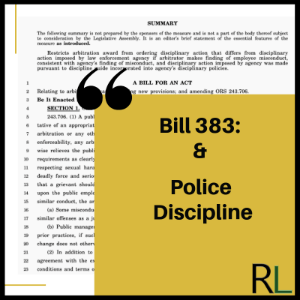
There has been a watchful eye on the police for sometime now. In and around Portland it seems like cops have been making the headlines fairly often. Here are some of the headlines we have seen over the past couple weeks:
16-year-old boy armed with knife shot, killed by officer (Vancouver police)
Racist policing plagues Portland’s nightclubs
Although, it is this recent headline below that really encourages us to write today:
Bills before lawmakers would curb arbitration, require psychological screening, mental health programs for police
Let’s Start with the 1st Headline
Vancouver police: 16-year-old boy armed with knife shot, killed by officer
This article definitely makes us wonder if the police were acting rationally or reacting carelessly. The gist of the story is that a 16 year old non-white boy was defending his girlfriend from being assaulted. He was found holding a knife when police show up. Reported by Fox 12.
The following day another piece is published by The Columbian concerning the same event. However, this article highlights the backstory on the 16 year old boy, Clayton S. Joseph. This account paints a picture of a troubled young man who was just starting to get his life inline. We didn’t really seem to get any more information of took place that day? Was shooting the boy necessary? The story we received is painted through the eyes of the court system and Evergreen School District.
Maybe no other facts can be stated at this point. For one, the 16 year old boy, Clayton S. Joseph, is not here to speak for his side of the story. Maybe the cops did exactly what was necessary. We have no way of knowing. As the public, we are given the information that the news provides. Remember that point as we move forward.
The 2nd Headline:
Racist policing plagues Portland’s nightclubs
This article, by High Country News, is interesting and disturbing on many levels. It makes us question what decade we’re living in. The racism that is described is not something that we all deal with. For example, if you’re not a black man in Portland you may never have experienced this. If you are not frequenting the nightlife scene you may be unaware of protocol. Another possibility could be that racism is outside of your worldview so you don’t recognize it. Let’s dig in.
Imagine you’re a black man, in this case Thompson. You are an event promoter. Tonight you’re promoting a birthday party happening at a local nightclub. When you arrive at the door you are refused access. The bouncers at the door tell you that you are excessively matching and they fear you may be wearing gang colors. You express to them that you are the promoter of the event. They don’t care and you are turned away. Days later your friend shows up at the same club in the literally the same attire and they let him in.
When was the last time you wore red or the last time your sweatshirt matched your tennis? Did you get harassed for it? Check out this excerpt:
Thompson was baffled: He was supposed to be working at the bar he was trying to get into, and he wondered exactly what gang recruits members like him: a friendly father edging toward 40 who gets up early for work. He pulled a business card from his wallet. “I’m the furthest thing from a gang member,” he said, his voice rising. “I’m hosting the party.”
More Dirty security guards gathered around the pair, backing up Monroe. By this time, Thompson was furious. “If y’all want to be racist — OK,” he said. “My lawyers will be talking to you really soon.”
He handed his phone to a friend, and told him to take his picture.
Thompson posted the photo — him standing in his red sweatshirt and sneakers in front of Dirty — to Facebook: “PLEASE SHARE!!!” he wrote, “I couldn’t get in to Dirty because my shirt matched my shoes. … Tired of getting racially profiled in Portland, Oregon.”
There’s more to this story. Thompson, was not happy about this and decided to hire an attorney. Thompson previously owned a venue in Northeast Portland that was targeted by the police and eventually he had to shut it down due to all of the restrictions that were put onto the venue. This was the last straw for him. Here’s an excerpt:
“But two months after opening, Thompson started hearing from police that they considered his bar to be a gang hangout, largely because of the blue building. The color, they said, was associated with the Crips. “I had to paint it a whole different color,” he said. He chose beige to assuage any concerns that it was a place for gang members. But the bland paint didn’t change anything. From the day it opened, the police paid close attention to the place. Thompson believes his bar was heavily over-policed: Police said they found a gun during a search of the bar’s bathroom garbage, and when the shooting of a teenager occurred three blocks away from Seeznin’s, police claimed it started at Seeznin’s.
“The police used to come to my bar and sit in front of the damn bar with their lights on. For hours,” he said, “like something happened.”
In June 2011, police alleged that a fight broke out at Seeznin’s that led to the shooting death of a man in the parking lot of a restaurant, across a four-lane road. And even though Thompson argued that the fight had nothing to do with his bar, he was slapped with a list of restrictions he had to abide by in order to keep his liquor license, from closing at 11 p.m. to hiring four extra security guards for weekend nights to enforcing a dress code restricting “clothing known to be associated with gang membership” — a requirement similar to the one that later blocked him from the Dirty.
“I didn’t have the money to do it,” he said. So he closed Seeznin’s.
This article is powerful. It is a long read but totally worth the time. If we know what is happening in our city then we begin to have the power to change it.
Headline Three: Police Accountability
Bills before lawmakers would curb arbitration, require psychological screening, mental health programs for police
This is a bill that would require police to go through psychological evaluation prior to being accepted on the force and then would provide mental health support on the job. It’s quite baffling that this doesn’t already exist everywhere. This is a good thing and arguably, very necessary. Here is the part of the article that interested us the most. This is from Oregon Live.
But the arbitration bill drew the most comment. It would bar arbitrators from overturning employee discipline if the sanctions followed local ordinances and local public policy on sexual harassment, unjustified use of physical or deadly force and criminal misconduct.
This is what we are really interested in. When a police officer gets in trouble they have the option to purse arbitration through the police union, in order to have their discipline overturned. Here’s how it works. Stated in an article from The City Paper:
Since public-safety unions can’t strike, arbitration plays a central role in settling disputes with management. Under the city’s contract with the Fraternal Order of Police (the police union), officers have the right to appeal discipline imposed by the city through an arbitration process. A panel, usually comprised of one representative each from the city, the union and a third “neutral” arbitrator, decides whether the city’s decision was justified.
Police unions are successful in overturning about 62 percent of disciplinary decisions nationwide, according to Will Aitchison, director of Labor Relations Information System, an organization that tracks trends in public-sector unions and holds police discipline seminars.
There are some problems we see with arbitration. One issue is the facts are not made public. So if a police officer is facing termination or felony charges and it was overturned in arbitration, no one outside of the courtroom would know why the ruling was overturned. This puts a lot of faith in the arbitrator’s decisions since there is no transparency. As stated by The City Paper:
“Every single case should be tracked: what the chief decided, what the public-safety director decided, what the arbitrator decided […] the final decision should be public,” says McNeilly, now chief of the Elizabeth Township police. “[Officers] do some really bad things and they get away with it; it’s little wonder the public loses faith.”
In the cases the FOP appeals, Campbell says, “we have a basis to say that either there should be no discipline, or if there should, it should be short of firing. The idea of discipline isn’t to punish people; it’s to make you a better employee.” And, Campbell adds, since personnel issues are often in play at arbitration hearings, it wouldn’t be appropriate to make them open to the public.
People Supporting the Bill
Several lawmakers and representatives of Oregon cities and counties favored the bill, while Oregon’s Coalition of Police & Sheriffs vigorously opposed it.
If city or county commissioners approve a code of conduct for their workers, it should stand, said Scott Winkels, representing the League of Oregon Cities, and Rob Bovett, legal counsel for the Association of Oregon Counties.
Rep. Ron Noble, R-McMinnville, who served eight years as police chief in McMinnville and spent 28 years as an officer, said the three bills will “help people like me maintain order and maintain the best people.”
The psychological screening and mental health wellness bills appear to have legislative support this session, but the arbitration bills may be routed to a work group for more discussion.
“We are hoping it goes to a work group to bring stakeholders” together to try to come to some agreement, said Troy Duker, Frederick’s chief of staff.
What do Shooting, Racism and Bill 383 have in Common
We looked at three articles here today. There is a common factor laced through each of them. The police need to be accountable for their actions just as citizen are. Citizens have to answer to the police so police need to answer to someone who has some authority over them. If the police are not held accountable for their actions there is something lacking in our judicial system.
The more power a person is given, the more they should be held accountable for their actions. We are not able to adequately judge whether the police acted responsibly or reacted under precepts of racism just by reading these articles. The people who are able to determine that information need to be able to have the final say without having their decision overturned. This is a problem that needs fixing for the safety of everyone.
Senate Bill 383
Supporting the Bill
Bill 383 was introduced at a public hearing yesterday. There are no results at this moment.
If you would like to support this bill please contact your senator. When you contact them be prepared to provide them with clear examples of why you support the bill. This is a democracy, use your voice for change.

